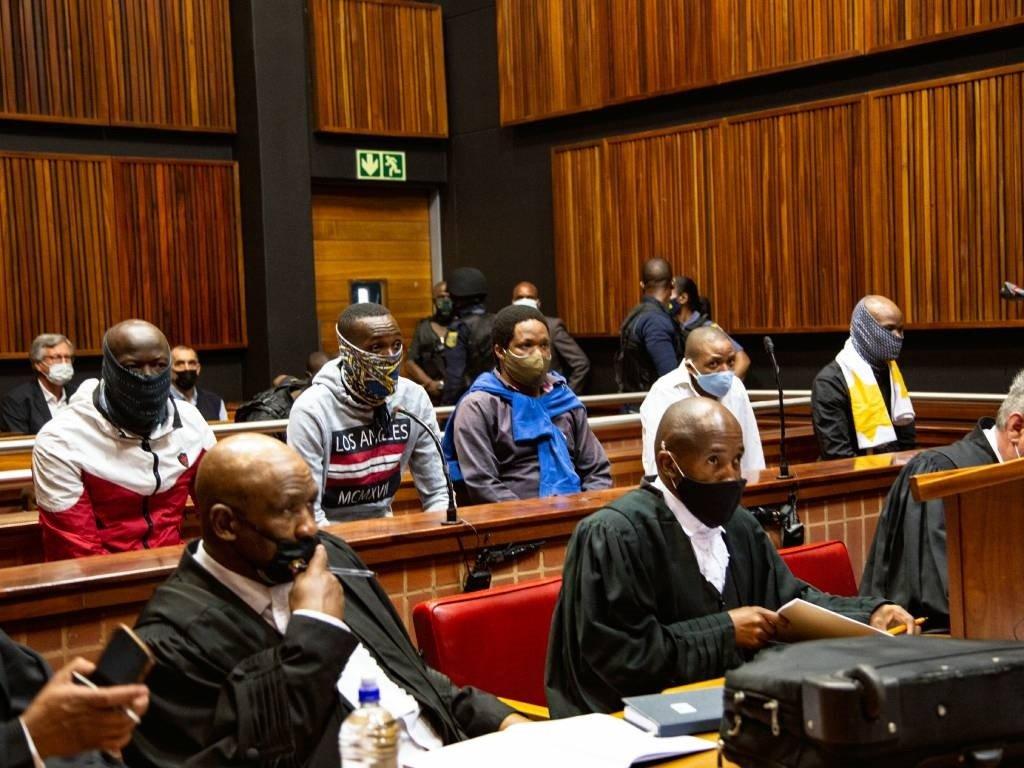Africa-Press – South-Africa. Advocate Malesela Teffo has again failed to convince the Gauteng High Court in Pretoria to halt the Senzo Meyiwa murder trial in order to have a trial within a trial regarding confessions and the arrests of the accused.
On Friday, Teffo, who represents four of the five men accused of murdering former Bafana Bafana captain Senzo Meyiwa, requested that court proceedings be stopped to address his clients’ rights. He said their rights were violated during their first appearance in court more than two years ago.
Senzo Meyiwa trial: Why the defence wants to open case against Kelly Khumalo’s lawyer
Teffo had initially said his clients’ rights were violated because they had not been informed of their rights, they were not told why they were appearing in court and were never formally charged. He then changed his tune and argued that the trial needed to be halted to have a trial within a trial to test the admissibility of confession statements given by two of the accused.
These statements allegedly led to the arrest of the other three accused.
Teffo said.
However, Judge Tshifhiwa Maumela made short work of his judgment, finding that the issues raised by Teffo were not brought before the court properly, but instead came by way of evidence led by Teffo from the bar.
On Monday, Teffo submitted what he called a special plea and asked that the matter be discussed in chambers.
Following an adjournment, prosecutor advocate George Baloyi said they could not reach consensus on the issues of a trial within a trial being held at this stage and about whether the trial should continue, pending Teffo’s special plea application.
Advocate Zandile Mshololo, who represents the fifth accused, said she did not oppose the application, but wanted to complete her cross-examination of the State’s first witness before the application was argued. Baloyi agreed that Mshololo should be allowed to finish her cross-examination.
“We are in the middle of cross-examination by counsel for accused five, and naturally the correct order of doing things will be to allow the cross-examination to take its course and thereafter deal with the issues raised in the special plea for which we have just received papers this morning,” Baloyi said.
Teffo’s arguments
In reply, Teffo briefly argued that his special plea could be brought at any stage of the proceedings, could interrupt proceedings, and that the court would have no choice but to entertain the special plea to the end.
Teffo said:
“Special plea is a game changer. That is why it’s so special. It’s a plea, it’s a request, and in this we request this court to entertain a trial within a trial whereby accused one to four are before this court in a manner that is not constitutional, where their constitutional rights had been violated,” Teffo said.
He then went back to the issue of holding a trial within a trial, seemingly not wanting the trial to continue until the admissibility of the confession statements had been ruled upon. This, despite the fact that the State was the dominus litis, meaning that the State was in charge of the trial and could effectively decide if it wanted to produce the confession statements and, if so, could do so when it deemed fit.
Teffo appeared to then go into the merits of his special plea, no longer arguing why it should be heard before the continuation of cross-examination by Mshololo. He alleged that the accused were “profusely assaulted” to the extent that confessions were “solicitated out of the assault”.
Teffo also alleged that one of the accused did a pointing out at the scene after being assaulted by police officers, even though he was allegedly in KwaZulu-Natal on the evening of the murder. He also went on a tirade about not ignoring the special plea as it would be to the peril of the court and comparing the alleged assault of the accused to the assault of political activists during apartheid.
Teffo said:
He also raised the issue of two case numbers and dockets pertaining to Meyiwa’s murder having been investigated with different suspects identified.
Ruling
Going through the arguments, Maumela again found that there was not a substantive application before him. He further explained that the confession statements were not before the court and could not be addressed as Teffo had requested.
“If advocate Baloyi seeks to bring before court confessions and desires to persuade the court to rely on the confessions, my sense is that then and only then, would leeway have come open for anyone affected to move legally, constitutionally and procedurally as they deem fit,” Maumela said.
Following the ruling, Teffo requested a copy of the order, stating that he would not leave the issue.
For More News And Analysis About South-Africa Follow Africa-Press






